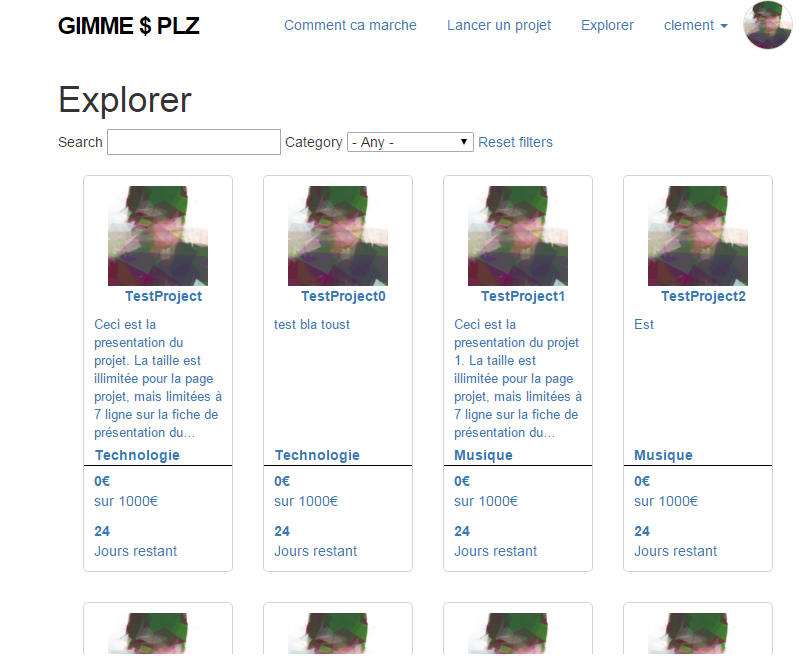Building a kickstarter clone with rails part 3
Categories and search engine
I decided that I wanted to add categories to my project, and that I wanted to be able to sort the project index by categories. Oh, and while I’m at it, why not add a search bar! I’m sure I wont get depressed if I fail!
So adding the category is easy, its just a matter of adding a field to my db.
Just run rails g migration AddCategoryToProjects category:string and rake db:migrate, and as usual, add the field in the new and edit view
# _project_form.html.erb
<%= f.label :'Categorie' %><br>
<%= f.select :category, Project.options_for_category %>I added the options in my projects model:
def self.options_for_category
[
'Art',
'BD',
'Artisanat',
'Danse',
'Design',
'Mode',
'Cinema & video',
'Gastronomie',
'Jeux',
'Journalisme',
'Musique',
'Photographie',
'Edition',
'Technologie',
'Theatre'
]Done!
Ok so now in order to sort and search, I’m gonna have to rebuild the @projects variable my projects controller passes to my views.
Should I … should I try to … find a gem that does it for me?
YES!
The first one I found was elasticsearch. And I loved it. Easy to use, extremely fast and powerful, what’s not to love?
Well, the deployment to heroku wasn’t exactly smooth : You need to add the Heroku bonsai add-on (that means having a verified heroku account), set it up, add a elasticsearch rake task, import the records…
I’ll be honest, when I saw that it wasn’t working immediately, I decided to find an other solution. If I was building a huge site, with a huge database, I would consider it, but for now I dont really need that much power.
So I found filterrific.
The documentation is pretty much self-explanatory, but lets go through it anyway:
The first step after installing the gem is to make sure I update my model:
filterrific(
default_filter_params: {},
available_filters: [
:search_query,
:with_category
]
)I only need 2 filters for now: a search box, and a category filter.
scope :with_category, lambda { |categories|
where(category: [*categories])
}
scope :search_query, lambda { |query|
# Searches query on the 'title' and 'description' columns.
# Matches using LIKE, automatically appends '%' to each term.
# LIKE is case INsensitive with MySQL, however it is case
# sensitive with PostGreSQL. To make it work in both worlds,
# we downcase everything.
return nil if query.blank?
# condition query, parse into individual keywords
terms = query.downcase.split(/\s+/)
# replace "*" with "%" for wildcard searches,
# append '%', remove duplicate '%'s
terms = terms.map { |e|
('%' + e.gsub('*', '%') + '%').gsub(/%+/, '%')
}
# configure number of OR conditions for provision
# of interpolation arguments. Adjust this if you
# change the number of OR conditions.
num_or_conds = 2
where(
terms.map { |term|
"(LOWER(projects.title) LIKE ? OR LOWER(projects.presentation) LIKE ?)"
}.join(' AND '),
*terms.map { |e| [e] * num_or_conds }.flatten
)
}And here is the filter declaration: I followed the examples in the doc. I just changed the second one slightly to search in the whole field.
Im sure the search query is not very efficient with a lot of data, but that will be enough for now I guess
I then added a few line in my project controller:
def index
@filterrific = initialize_filterrific(
Project,
params[:filterrific],
select_options:{
with_category: Project.options_for_category
}
) or return
@projects = @filterrific.find.page(params[:page])
respond_to do |format|
format.html
format.js
end
endHere what happens is filterrific is gonna take care of building the new indew based on my query. I can still paginate the results without changing anything so thats pretty cool.
I then only need to change my index view:
<div id="projects" >
<%= form_for_filterrific @filterrific do |f| %>
<div class="filterrific">
Search
<%# give the search field the 'filterrific-periodically-observed' class for live updates %>
<%= f.text_field(
:search_query,
class: 'filterrific-periodically-observed'
) %>
</div>
<div class="filterrific">
Category
<%= f.select(
:with_category,
@filterrific.select_options[:with_category],
{ include_blank: '- Any -' }
) %>
</div>
<div class="filterrific">
<%= link_to(
'Reset filters',
reset_filterrific_url,
) %>
</div>
<%# add an automated spinner to your form when the list is refreshed %>
<%= render_filterrific_spinner %>
<% end %>
<%= render @projects %>
</div>Once again the documentation is very good, not a lot to add there.
After a bit of styling, the result is something like that:

It still needs a bit of polish but it works well enough for now.